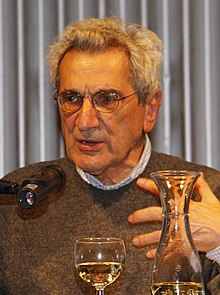安东尼奥·奈格里
此條目需要补充更多来源。 (2018年9月23日) |
| 安东尼奥·奈格里 | |
|---|---|
 安东尼奥·奈格里,2009年11月21日 | |
| 出生 | 1933年8月1日 |
| 逝世 | 2023年12月16日(90歲) |
| 母校 | 帕多瓦大学 意大利历史研究所[7] |
| 机构 | 帕多瓦大学[8] 巴黎第八大学 巴黎第七大学[8] 巴黎高等师范学院[8] 巴黎国际哲学院 |
| 时代 | 当代哲学 |
| 地区 | 西方哲学 |
| 学派 | 歐陸哲學 自治主义马克思主义 新斯宾诺莎主义[1][2][3][4][5] |
主要领域 | 政治哲学 · 阶级斗争 · 全球化 · 公共事物 · 生命政治 |
著名思想 | 全球化哲学 · 诸众 · 帝国理论 · 制宪权 · 非物质劳动[6] · 后福特制 · 另类现代性 · 拒绝工作 |
影响于
| |
安东尼奥·奈格里(義大利語:Antonio Negri, 1933年8月1日—2023年12月16日),是一位意大利马克思主义社会学家和政治哲学家,他以著作《帝国》和对斯宾诺莎的研究而出名。
生平
1933年8月1日出生于意大利帕多瓦 ,他在家乡的大学成为了一名政治哲学教授。奈格里于1969年创办了工人力量组织(Potere Operaio)而且成为著名的“自治运动”(Autonomia Operaia)的领军人物。作为最受欢迎的自治主义理论家之一,他出版了极有影响力的书籍,力倡“革命意识”。
他在20世纪70年代末被指控多项罪名,包括成为左翼游击队组织红色旅的策划者,参与了1978年5月绑架意大利两届总理阿尔多·莫罗和基督教民主党领袖以及其他人。 他被误认为是代表无线电通信局进行了一次威胁电话,但是法院无法最终证明此事。奈格里与左翼极端主义共谋的问题是一个有争议的话题。 他被指控犯有多项罪名,包括“反政府叛乱”(后来被撤销的指控),并因参与两起谋杀案而被判刑。[9]
奈格里逃到法国,在那里,受密特朗法案(the Mitterrand doctrine)的保护,他与雅克·德里达、米歇尔·福柯和吉尔·德勒兹一起在巴黎第八大学和国际哲学学院(Collège international de philosophie)任教。1997年,在辩诉之后,他把服刑时间从30年缩短到13年,回到意大利服刑。他的许多有影响力的著作都是在他入狱的时候出版的。他和妻子现在居住在威尼斯和巴黎,他的妻子是法国哲学家朱狄特·勒韦尔(Judith Revel)。
2023年12月16日,奈格里在巴黎逝世,享年90岁。[10]
主要著作
奈格里与迈克尔·哈特合作:
- 《狄俄尼索斯的劳动:对国家形式的批判》(Labor of Dionysus: A Critique of the State-Form,1994)
- 《帝国》(Empire, 2000)
- 《诸众》(Multitude: War and Democracy in the Age of Empire,2004)
- 《大同世界》 (Commonwealth, 2011)
相关阅读
https://www.thepaper.cn/newsDetail_forward_1283433 (页面存档备份,存于互联网档案馆)
参考来源
- ^ Negri, Antonio: The Savage Anomaly: The Power of Spinoza's Metaphysics and Politics. Translated from the Italian by Michael Hardt. (Minneapolis: University of Minnesota Press, 1991). Originally published as L'anomalia selvaggia: Saggio su potere e potenza in Baruch Spinoza (Milano: Feltrinelli, 1981). Antonio Negri (1981): "This work [The Savage Anomaly] was written in prison. And it was also conceived, for the most part, in prison. Certainly, I have always known Spinoza well. Since I was in school, I have loved the Ethics (and here I would like to fondly remember my teacher of those years). I continued to work on it, never losing touch, but a full study required too much time. [...] Spinoza is the clear and luminous side of Modern philosophy. [...] With Spinoza, philosophy succeeds for the first time in negating itself as a science of mediation. In Spinoza there is the sense of a great anticipation of the future centuries; there is the intuition of such a radical truth of future philosophy that it not only keeps him from being flattened onto seventeenth-century thought but also, it often seems, denies any confrontation, any comparison. Really, none of his contemporaries understands him or refutes him. [...] Spinoza's materialist metaphysics is the potent anomaly of the century: not a vanquished or marginal anomaly but, rather, an anomaly of victorious materialism, of the ontology of a being that always moves forward and that by constituting itself poses the ideal possibility for revolutionizing the world."
- ^ Toscano, Alberto. The Politics of Spinozism: Composition and Communication (Paper presented at the Cultural Research Bureau of Iran, Tehran, January 4, 2005) (PDF). January 2005 [20 June 2019]. (原始内容存档 (PDF)于2022-03-14).
- ^ Ruddick, Susan (2010), 'The Politics of Affect: Spinoza in the Work of Negri and Deleuze,'. Theory, Culture & Society 27(4): 21–45
- ^ Grattan, Sean (2011), 'The Indignant Multitude: Spinozist Marxism after Empire,'. Mediations 25(2): 7–8
- ^ Duffy, Simon B. (2014), 'French and Italian Spinozism,'. In: Rosi Braidotti (ed.), After Poststructuralism: Transitions and Transformations. (London: Routledge, 2014), p. 148–168
- ^ Antonio Negri and Michael Hardt, Empire (Cambridge, Massachusetts & London, England: Harvard University Press, 2000), § 3.4.
- ^ Elsa Romeo, La Scuola di Croce: testimonianze sull'Istituto italiano per gli studi storici, Il Mulino, 1992, p. 309.
- ^ 8.0 8.1 8.2 Maggiori Robert, "Toni Negri, le retour du «diable» 互联网档案馆的存檔,存档日期5 January 2016.", Libération.fr, 3 July 1997.
- ^ 奈格里是谁?“帝国”是什么意思?_思想市场_澎湃新闻-The Paper. www.thepaper.cn. [2019-03-17]. (原始内容存档于2020-09-19).
- ^ Toni Negri è morto, il leader di Autonomia Operaia è deceduto nella notte a Parigi. La Repubblica. 16 December 2023 [16 December 2023]. (原始内容存档于2023-12-17).
